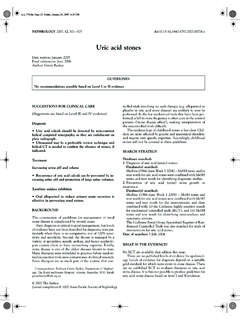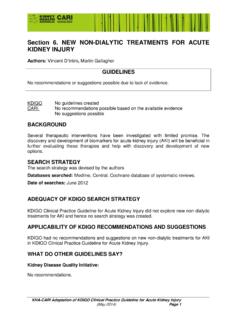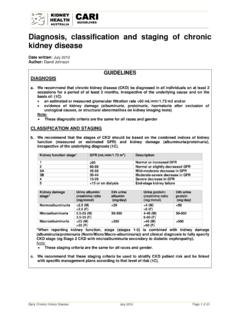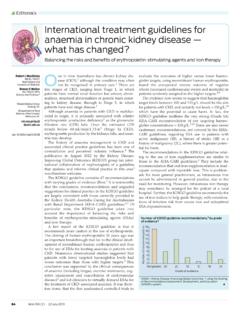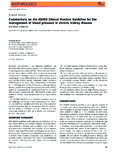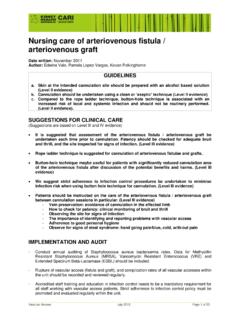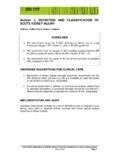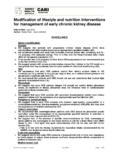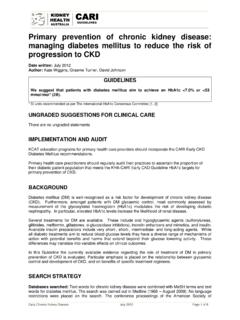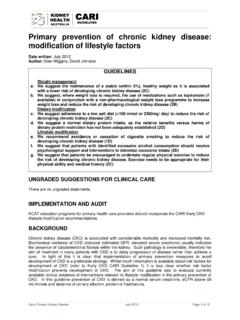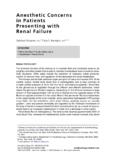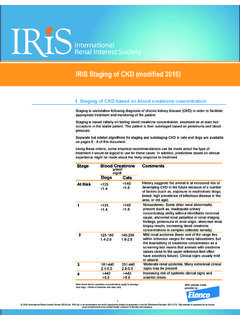Transcription of When to refer for specialist renal care - KHA-CARI …
1 _____Early Chronic Kidney Disease July 2012 Page 1 of 13 When to refer for specialist renal care Date written: March 2012 Author: David Johnson GUIDELINES a. We recommend referral to a specialist renal service or nephrologist in the following situations: i. Stage 4 and 5 chronic kidney disease of any cause (estimated glomerular filtration rate <30mL/ ) (1C) ii. Persistent significant albuminuria (albumin creatinine ratio 30 mg/mmol, approximately equivalent to protein creatinine ratio 50 mg/mmol, or urinary protein excretion 500 mg/24 hours) (1C) iii. A consistent decline in estimated glomerular filtration rate from a baseline of <60 ml/ m2 (a decline >5 ml/ m2 over a six month period which is confirmed on at least three separate readings) (1C)* b.
2 We suggest referral to a specialist renal service or nephrologist in the following situations: i. Glomerular haematuria with macroalbuminuria (2C) ii. Chronic kidney disease and hypertension that is hard to get to target despite at least 3 anti-hypertensive agents (2C) c. We suggest discussing management issues with a specialist by letter, email or telephone in cases where it may not be necessary for the person with chronic kidney disease to be seen by the specialist (2D). d. Once a referral has been made and a plan jointly agreed, routine follow-up could take place at the patient s General Practitioner surgery rather than in a specialist clinic. If this is the case, we recommend that criteria for future referral or re-referral should be specified (1D).
3 E. We suggest that the individual s wishes and comorbidities when considering referral, be taken into account (2D). *It is important to note that intra-individual variation in eGFR readings can be as high as 15-20% between consecutive eGFR measurements, such that a number of readings are required before one can be confident that a decrease in eGFR of >5 ml/ m2 in 6 months is real. UNGRADED SUGGESTIONS FOR CLINICAL care There are no ungraded statements. IMPLEMENTATION AND AUDIT Kidney Check Australia Taskforce (KCAT) education programs for primary health care providers should incorporate the KHA-CARI nephrologist referral criteria. Kidney Health Australia and KCAT should commission audits of the awareness of the KHA-CARI nephrologist referral criteria amongst primary health care providers.
4 A similar audit of nephrologists awareness of the CARI nephrologist referral criteria would also be useful. BACKGROUND Chronic kidney disease (CKD) is a major public health problem in Australia and throughout the world. Based on data from the AusDiab study[1], it is estimated that over million Australian adults have at least one manifestation of CKD. This includes million individuals with at least moderate kidney failure (defined as a GFR < 60 mL/ ), 800,000 with microalbuminuria, 80,000 with _____Early Chronic Kidney Disease July 2012 Page 2 of 13 macroalbuminuria and 600,000 with persistent haematuria. With so many affected individuals and only approximately 250 nephrologists in Australia, it is clear that the vast majority of CKD patients (stages 1, 2 and 3) will be managed principally in the primary health care setting.
5 On the other hand, a number of studies [2-12] have demonstrated that early referral of patients with more serious CKD to a multidisciplinary renal unit is associated with reduced rates of kidney failure decline, decreased need for and duration of hospitalization, increased likelihood of permanent dialysis access created prior to dialysis onset, reduced initial costs of care following the commencement of dialysis, increased likelihood of kidney transplantation, and decreased patient morbidity and mortality. Nevertheless, approximately 30% of CKD patients in Australia are referred late to nephrologists (ie. within 3 months of needing to commence kidney replacement therapy)[13] Such late referred patients have markedly reduced survival rates on dialysis and are much less likely to receive a kidney transplant [14] These results have prompted a renewed focus on identifying patients with severe, progressive or high risk CKD in primary practice and referring them to nephrologists well in advance of their requiring dialysis or kidney transplantation[15] Expert panels have consequently produced clinical practice guidelines that recommend earlier referral to a nephrologist under specific circumstances [16-20].
6 However, these guidelines have been criticised on the basis that there is no high level clinical evidence to support such referral criteria, there have been no assessments of the health economic impact of implementing such guidelines and there has been no account taken of the complexities of decision-making processes for referral of CKD patients, such as the poor predictability of CKD progression, the concomitant presence of multiple comorbid medical problems in a predominantly aged population, the role of functional loss and cognitive impairment in the decision making process, and the presence of competing risks (eg many patients with CKD have a much higher risk of dying from cardiovascular disease than progressing to end-stage kidney failure and requiring renal replacement therapy) [15].
7 Consequently, previous studies have shown that primary care physician use of CKD clinical practice guidelines has been limited[21, 22]. Moreover, primary care physicians were less likely to be aware of existing practice guidelines and recommend renal specialist referral than their nephrologist colleagues when presented with hypothetical clinical scenarios on CKD [23, 24]. Instead, the referral practices of primary care physicians are primarily influenced by patient factors (such as kidney function, symptoms, age, race, education level, insurance status, number and severity of medical comorbidities, functional impairment, cognitive impairment, anxiety level, litigiousness) [21, 24-32] and physician factors (such as number of CKD patients in practice, clinical uncertainty, number of years in practice, expectations of nephrologist, awareness of guidelines, medical training and geographic location) [21, 23-25, 27, 28, 30-37].
8 A recent online survey of 479 internal medicine residents in the United States to determine their perceptions of indications for nephrology referral in CKD management showed widely divergent results for proteinuria (45%), uncontrolled hypertension (64%), hyperkalemia (26%), anemia (28%), CKD bone disorder (45%), GFR) <30 ml/ m2 (90%) and rapid decline in GFR (79%)[38] Since criteria for nephrologist referral have substantial implications for health care utilisation, health costs, clinical outcomes and patient quality of life, it is important that they maximise anticipated health outcomes in the face of constrained manpower and limited resources [15, 33, 39] In general terms, the main potential benefits associated with timely, appropriate nephrologist referral include: a.
9 Optimised patient planning and preparation for dialysis or kidney transplantation (including establishment of permanent dialysis access); b. Improved diagnosis and management of treatable kidney disease (eg certain forms of glomerulonephritis) requiring specialist medical investigation (eg renal biopsy) and/or therapy (eg immunosuppression); c. Retarded CKD progression through improved control of CKD risk factors; and, d. Enhanced management of CKD-related complications, such as significant renal anaemia (haemoglobin <100 g/L), CKD mineral and bone disorder (CKD-MBD) and refractory hypertension. These potential benefits must be weighed against the potential disadvantages of nephrologist referral: a.
10 Saturation of limited nephrologist manpower and resources, thereby limiting the access of high risk CKD patients most likely to benefit from specialist renal services; b. Inefficient health care utilisation; and c. Heightened anxiety and possibly unnecessary and costly investigation of patients with less serious CKD that is eminently manageable in primary health care . The objective of this guideline is to develop specialist renal services referral criteria for CKD patients in the primary care setting. The guideline group primarily focused on evidence identifying CKD patients _____Early Chronic Kidney Disease July 2012 Page 3 of 13 whose outcomes were improved by specialist versus primary health care management.
